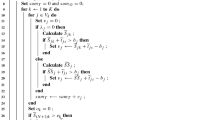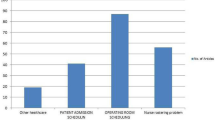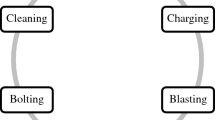Abstract
This paper surveys the problem of predictive / reactive scheduling of an integrated operating theatre with two types of demand for surgery: 1) elective or known demand; 2) emergency or uncertain demand. The stochastic arrival of emergency patients with uncertain surgery time enforces the scheduler to react to disruption and modify scheduling plan of elective patients. We focus on this predictive / reactive scheduling problem which has not been investigated in such way before. As in hospitals, at the time of occurrence a disruption in a surgical suite, the scheduler has not enough time to make the best decision; we propose a new approach based on two-stage stochastic programming model with recourse which determines the best recourse strategy in advance of any disruption occurrence. Using the proposed approach, the primary schedule is generated in such a way that it can absorb disruption with minimum effect on planned elective surgeries. For the first time in operating theatre planning, two new significant sets of performance measures comprising “robustness” and “stability” measures are considered in generation of primary schedule which will be shown to be of great importance in efficiency of surgical suite planning. Computational experiments performed on sets of generated problem based on the data obtained from a non-profit hospital. In order to demonstrate efficiency of the proposed method, computational results of the proposed approach are compared with classic approach.


Similar content being viewed by others
References
Cardoen, B., Demeulemeester, E., and Beliën, J., Operating room planning and scheduling: A literature review. Eur. J. Oper. Res. 201:921–932, 2010.
Ogulata, S. N., and Erol, R., A hierarchical multiple criteria mathematical programming approach for scheduling general surgery operations in large hospitals. J. Med. Syst. 27:259–270, 2003.
Guerriero, F., and Guido, R., Operational research in the management of the operating theatre a survey. Health Care Manag. Sci. 14:89–114, 2011.
Bruni, M. E., Beraldi, P., and Conforti, D., A stochastic programming approach for operating theatre scheduling under uncertainty. IMA J. Manag. Math. 2014. doi:10.1093/imaman/dpt027.
Batun S (2012) Scheduling multiple operating rooms under uncertainty. Dissertation, University of Pittsburgh.
MHallah, R., and Al-roomi, A. H., The planning and scheduling of operating rooms: A simulation approach. Comput. Ind. Eng. 78:235–248, 2014.
Addis, B., Carello, G., Grosso, A., Tanfani, E., Operating room scheduling and rescheduling: a rolling horizon approach. Flex. Serv. Manuf. J., 1–27, 2015.
Razmi, J., Yousefi, M. S., Barati, M., A stochastic model for operating room unique equipment planning under uncertainty, 2015.
Jebali, A., Alounae, A. B. H., and Ladet, P., Operating rooms scheduling. Int. J. Prod. Econ. 99:52–62, 2006.
Marcon, E., and Dexter, F., Impact of surgical sequencing on post anesthesia care unit staffing. Health Care Manag. Sci. 9:87–98, 2006.
Niu, Q., Peng, Q., Mekkawy, T. E., Tan, Y. Y., Bruant, H., Bernaerdt, L., Performance analysis of the operating room using simulation. Proceedings of the Canadian Engineering Education Association, 2007.
Saadouli, H., Jerbi, B., Dammak, A., Masmoudi, L., and Bouaziz, A., A stochastic optimization and simulation approach for scheduling operating rooms and recovery beds in an orthopedic surgery department. Comput. Ind. Eng. 80:72–79, 2015.
Dexter, F., Dexter, E. U., and Ledolter, J., Influence of procedure classification on process variability and parameter uncertainty of surgical case durations. Anesth. Analg. 110:1155–1163, 2010.
Stepaniak, P. S., Heij, C., and Vries, G. D., Modeling and prediction of surgical procedure times. Statistica Neerlandica 64:1–18, 2010.
Bowers, J., and Mould, G., Ambulatory care and orthopaedic capacity planning. Health Care Manag. Sci. 8:41–47, 2005.
Lamiri, M., Grimaud, F., and Xie, X., Optimization methods for a stochastic surgery planning problem. Int. J. Prod. Econ. 120(2):400–410, 2009.
Pham, D. N., and Klinkert, A., Surgical case scheduling as a generalized job shop scheduling problem. Eur. J. Oper. Res. 185:1011–1025, 2008.
Zonderland, M. E., Boucherie, R. J., Litvak, N., et al., Planning and scheduling of semi-urgent surgeries. Health Care Manag. Sci. 13:256–267, 2010.
Beliën, J., and Demeulemeester, E., A branch-and-price approach for integrating nurse and surgery scheduling. Eur. J. Oper. Res. 189:652–668, 2008.
Meskens, N., Duvivier, D., and Hanset, A., Multi-objective operating room scheduling considering desiderata of the surgical team. Decis. Support. Syst. 55:650–659, 2013.
Xiang, W., Yin, J., and Lim, G., An ant colony optimization approach for solving an operating room surgery scheduling problem. Comput. Ind. Eng. 85:335–345, 2015.
Geranmayeh, S., Optimizing surgical scheduling through integer programming and robust optimization. Master thesis, university of Ottawa, 2015.
Jebali, A., and Diabat, A., A stochastic model for operating room planning under capacity constraints. Int. J. Prod. Res. 2015. doi:10.1080/00207543.2015.1033500.
Lamiri, M., Xie, X., Dolgui, A., and Grimaud, F., A stochastic model for operating room planning with elective and emergency demand for surgery. Eur. J. Oper. Res. 185:1026–1037, 2008.
Astaraky, D., and Patrick, J., A simulation based approximate dynamic programming approach to multi-class, multi-resource surgical scheduling. Eur. J. Oper. Res. 245:309–319, 2015.
Kozan, E., An efficient dynamic patient scheduling approach for the operating theatre. In Asia Pacific Industrial Engineering & Management Systems Conference. Patong Beach, Phuket, Thailand, 2012.
Bhattacharyya, T., Vrahas, M. S., Morrison, S. M., Kim, E., Wiklund, R. A., Smith, R. M., and Rubash, H. E., The value of the dedicated orthopaedic trauma operating room. J. Trauma 60:1336–1341, 2004.
Aringhieri, R., Landa, P., Soriano, P., Tanfani, E., and Testi, A., A two level metaheuristic for the operating room scheduling and assignment problem. Comput. Oper. Res. 54:21–34, 2015.
Wullink, G., Houdenhoven, M. V., Hans, E. W., Oostrum, J. M. V., Lans, M. V. D., and Kazemier, G., Closing emergency operating rooms improves efficiency. J. Med. Syst. 31:543–546, 2007.
Yang, B., and Geunes, J., Predictive–reactive scheduling on a single resource with uncertain future jobs. Eur. J. Oper. Res. 189:1267–1283, 2008.
Holloway, C. A., and Nelson, R. T., Job shop scheduling with due dates and variable processing times. Manag. Sci. 20(9):1264–1275, 1974.
Gören, S., Robustness and stability measures for scheduling policies in a single machine environment. Dissertation, Bilkent University, 2002.
Ruszczynski, A., and Shapiro, A., Two-stage problems. In: Shapiro, A. (Ed.), Lectures on stochastic programming, modeling and theory. Society for Industrial and Applied Mathematics and the Mathematical Programming Society, Philadelphia, pp. 27–63, 2009.
Author information
Authors and Affiliations
Corresponding author
Additional information
This article is part of the Topical Collection on Patient Facing Systems
Rights and permissions
About this article
Cite this article
Heydari, M., Soudi, A. Predictive / Reactive Planning and Scheduling of a Surgical Suite with Emergency Patient Arrival. J Med Syst 40, 30 (2016). https://doi.org/10.1007/s10916-015-0385-1
Received:
Accepted:
Published:
DOI: https://doi.org/10.1007/s10916-015-0385-1




